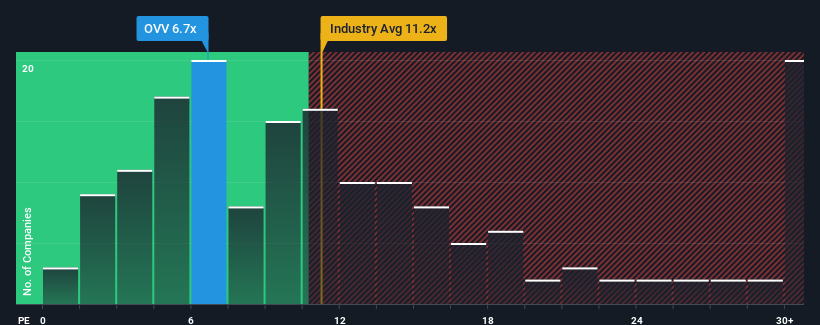- United States
- /
- Oil and Gas
- /
- NYSE:OVV
Why Investors Shouldn't Be Surprised By Ovintiv Inc.'s (NYSE:OVV) Low P/E

When close to half the companies in the United States have price-to-earnings ratios (or "P/E's") above 19x, you may consider Ovintiv Inc. (NYSE:OVV) as a highly attractive investment with its 6.7x P/E ratio. Nonetheless, we'd need to dig a little deeper to determine if there is a rational basis for the highly reduced P/E.
With earnings that are retreating more than the market's of late, Ovintiv has been very sluggish. It seems that many are expecting the dismal earnings performance to persist, which has repressed the P/E. If you still like the company, you'd want its earnings trajectory to turn around before making any decisions. Or at the very least, you'd be hoping the earnings slide doesn't get any worse if your plan is to pick up some stock while it's out of favour.
View our latest analysis for Ovintiv

How Is Ovintiv's Growth Trending?
There's an inherent assumption that a company should far underperform the market for P/E ratios like Ovintiv's to be considered reasonable.
If we review the last year of earnings, dishearteningly the company's profits fell to the tune of 58%. Unfortunately, that's brought it right back to where it started three years ago with EPS growth being virtually non-existent overall during that time. So it appears to us that the company has had a mixed result in terms of growing earnings over that time.
Shifting to the future, estimates from the ten analysts covering the company suggest earnings should grow by 4.1% per annum over the next three years. Meanwhile, the rest of the market is forecast to expand by 10% per year, which is noticeably more attractive.
With this information, we can see why Ovintiv is trading at a P/E lower than the market. It seems most investors are expecting to see limited future growth and are only willing to pay a reduced amount for the stock.
The Key Takeaway
It's argued the price-to-earnings ratio is an inferior measure of value within certain industries, but it can be a powerful business sentiment indicator.
We've established that Ovintiv maintains its low P/E on the weakness of its forecast growth being lower than the wider market, as expected. At this stage investors feel the potential for an improvement in earnings isn't great enough to justify a higher P/E ratio. It's hard to see the share price rising strongly in the near future under these circumstances.
We don't want to rain on the parade too much, but we did also find 5 warning signs for Ovintiv (1 makes us a bit uncomfortable!) that you need to be mindful of.
It's important to make sure you look for a great company, not just the first idea you come across. So take a peek at this free list of interesting companies with strong recent earnings growth (and a low P/E).
New: AI Stock Screener & Alerts
Our new AI Stock Screener scans the market every day to uncover opportunities.
• Dividend Powerhouses (3%+ Yield)
• Undervalued Small Caps with Insider Buying
• High growth Tech and AI Companies
Or build your own from over 50 metrics.
Have feedback on this article? Concerned about the content? Get in touch with us directly. Alternatively, email editorial-team (at) simplywallst.com.
This article by Simply Wall St is general in nature. We provide commentary based on historical data and analyst forecasts only using an unbiased methodology and our articles are not intended to be financial advice. It does not constitute a recommendation to buy or sell any stock, and does not take account of your objectives, or your financial situation. We aim to bring you long-term focused analysis driven by fundamental data. Note that our analysis may not factor in the latest price-sensitive company announcements or qualitative material. Simply Wall St has no position in any stocks mentioned.
Have feedback on this article? Concerned about the content? Get in touch with us directly. Alternatively, email editorial-team@simplywallst.com
About NYSE:OVV
Ovintiv
Explores, develops, produces, and markets natural gas, oil, and natural gas liquids in the United States and Canada.
Very undervalued with mediocre balance sheet.
Similar Companies
Market Insights
Community Narratives




